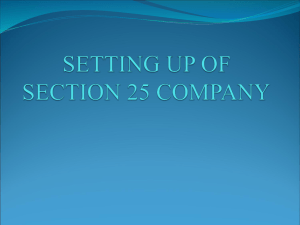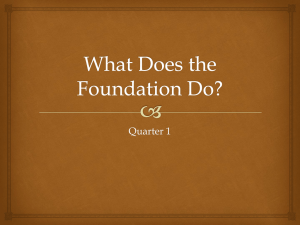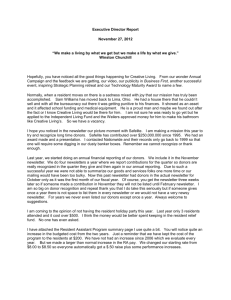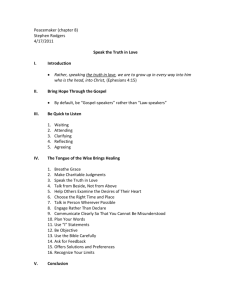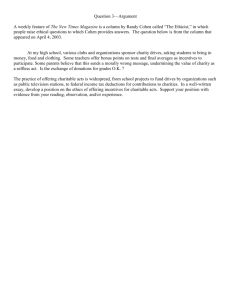AICPA Comments to IRS on Form 1041-A
advertisement
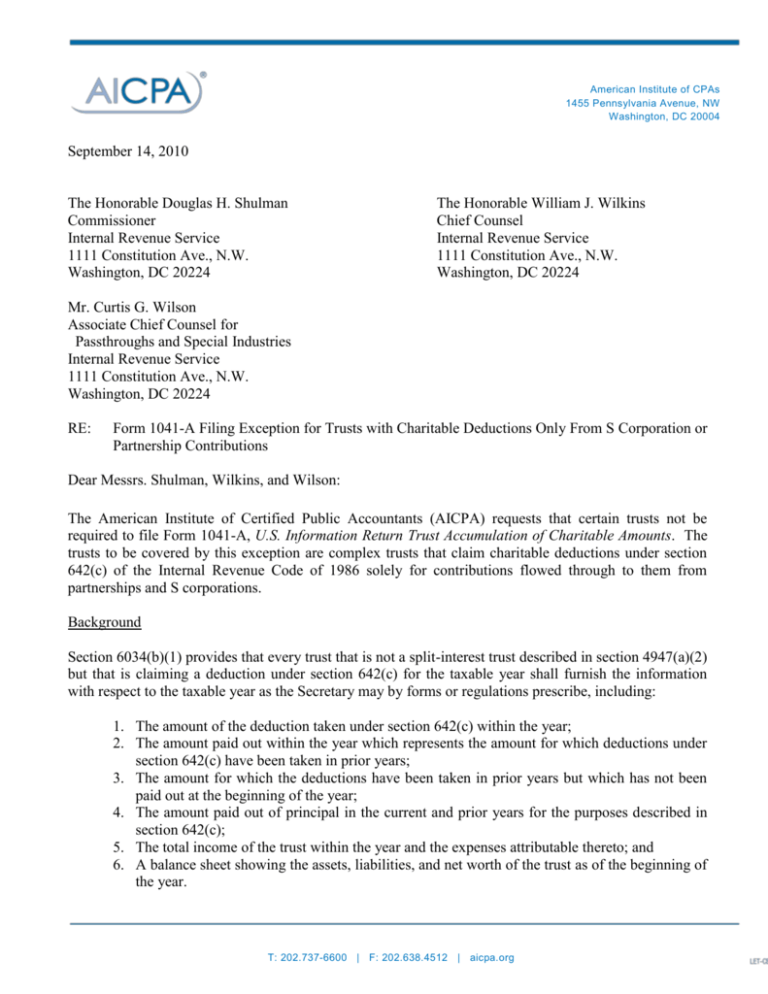
American Institute of CPAs 1455 Pennsylvania Avenue, NW Washington, DC 20004 September 14, 2010 The Honorable Douglas H. Shulman Commissioner Internal Revenue Service 1111 Constitution Ave., N.W. Washington, DC 20224 The Honorable William J. Wilkins Chief Counsel Internal Revenue Service 1111 Constitution Ave., N.W. Washington, DC 20224 Mr. Curtis G. Wilson Associate Chief Counsel for Passthroughs and Special Industries Internal Revenue Service 1111 Constitution Ave., N.W. Washington, DC 20224 RE: Form 1041-A Filing Exception for Trusts with Charitable Deductions Only From S Corporation or Partnership Contributions Dear Messrs. Shulman, Wilkins, and Wilson: The American Institute of Certified Public Accountants (AICPA) requests that certain trusts not be required to file Form 1041-A, U.S. Information Return Trust Accumulation of Charitable Amounts. The trusts to be covered by this exception are complex trusts that claim charitable deductions under section 642(c) of the Internal Revenue Code of 1986 solely for contributions flowed through to them from partnerships and S corporations. Background Section 6034(b)(1) provides that every trust that is not a split-interest trust described in section 4947(a)(2) but that is claiming a deduction under section 642(c) for the taxable year shall furnish the information with respect to the taxable year as the Secretary may by forms or regulations prescribe, including: 1. The amount of the deduction taken under section 642(c) within the year; 2. The amount paid out within the year which represents the amount for which deductions under section 642(c) have been taken in prior years; 3. The amount for which the deductions have been taken in prior years but which has not been paid out at the beginning of the year; 4. The amount paid out of principal in the current and prior years for the purposes described in section 642(c); 5. The total income of the trust within the year and the expenses attributable thereto; and 6. A balance sheet showing the assets, liabilities, and net worth of the trust as of the beginning of the year. T: 202.737-6600 | F: 202.638.4512 | aicpa.org The Honorable Douglas H. Shulman The Honorable William J. Wilkins Mr. Curtis G. Wilson September 14, 2010 Page 2 of 3 Section 6034(b)(2)(A) provides an exception to the reporting requirement of section 6034(b)(1) for a trust for any taxable year if all the income for the year, determined under the applicable principles of the law of trusts, is required to be distributed currently to beneficiaries. Trusts use Form 1041-A to satisfy their reporting obligation under section 6034(b). According to the instructions, the trustee must file Form 1041-A for a trust that claims a charitable deduction or other deduction under section 642(c) unless an exception applies. The exceptions are for a trust that is required to distribute currently to the beneficiaries all the income for the tax year determined under section 643(b) and the related regulations1; a charitable trust described in section 4947(a)(1)2; and for tax years beginning after 2006, a split-interest trust described in section 4947(a)(2).3 Section 642(c)(1) provides that a trust is allowed a deduction in computing its taxable income for any amount of the gross income, without limitation, that pursuant to the terms of the governing instrument is, during the taxable year, paid for a purpose specified in section 170(c). For a trust to claim a charitable deduction under section 642(c) for amounts of gross income that it contributes for charitable purposes, generally the governing instrument of the trust must give the trustee the authority to make charitable contributions. Reasons For Change Often trusts invest in partnerships that make charitable contributions. If the partnership makes a charitable contribution from its gross income, that income is never available to the trust. For federal tax purposes, however, the trust must take into account its distributive share of the partnership’s income, gain, loss, and deductions, and credits. These items include the amount of income given to charity and the corresponding deduction for that contribution. The Internal Revenue Service has recognized the trust’s ability to claim a charitable deduction in this situation despite the fact that the trust’s governing instrument does not authorize the trustee to make charitable contributions. See Rev. Rul. 2004-5, 2004-3 I.R.B. 295. A similar situation arises with respect to electing small business trusts (“ESBTs”) which own stock in an S corporation if the S corporation makes a contribution to charity from its gross income. Treasury Reg. §1.641(c)-1(d)(2)(ii) provides that if an ESBT is required to take into account a deduction attributable to an amount of the S corporation’s gross income that is paid by the S corporation for a charitable purpose, the contribution will be deemed to be paid by the S portion of the ESBT pursuant to the terms of the trust’s governing instrument within the meaning of section 642(c)(1). For many trusts that claim a charitable deduction under section 642(c), the contribution is made by partnerships and/or S corporations in which the trust owns an interest, and no contributions are actually made by the trust. In these situations, we recommend that the trust not be required to file Form 1041-A. Such trusts are not accumulating any income that may be distributed to charity in the future. The current charitable deductions are based solely on the current income of a flow-through entity, which contributes it directly to charity, and are not from any prior year’s accumulation of income by the trusts. 1 See section 6034(b)(2)(A). See section 6034(b)(2)(B). 3 See section 6034(a). 2 The Honorable Douglas H. Shulman The Honorable William J. Wilkins Mr. Curtis G. Wilson September 14, 2010 Page 3 of 3 As discussed above, the trusts themselves never received the amounts that were given to charity and never made any direct charitable contributions. Under these circumstances, being required to file Form 1041-A places an unnecessary burden on those trustees who are even aware of this filing requirement and does not yield any useful information for the Internal Revenue Service. We believe that an administrative exception should be created for these trusts because charitable deductions passed through to trusts from partnerships or S corporations do not fall within the scope and purpose of the information reporting requirement of section 6034(b). Recommendation Accordingly, we suggest a Notice be issued allowing an administrative exception to the Form 1041-A filing requirement for charitable deductions passed through to a trust from a partnership or S corporation and that the instructions to Form 1041-A be revised to add a fourth exception, namely, that the trustee of a trust whose deduction under section 642(c) is solely attributable to its share of charitable contributions made by partnerships and/or S corporations is not required to file Form 1041-A. * * * * * The AICPA is the national professional organization of certified public accountants comprised of approximately 360,000 members. Our members advise clients on federal, state and international tax matters and prepare income and other tax returns for millions of Americans. Our members provide services to individuals, not-for-profit organizations, small and medium-sized businesses, as well as America’s largest businesses. We thank you for the opportunity to present our comments and welcome the opportunity to discuss our comments further with you or others at the IRS. Please feel free to contact F. Gordon Spoor, Chair of the AICPA Trust, Estate, and Gift Tax Technical Resource Panel, at (727) 343-7166, or fgs@spoorcpa.com; Frances Schafer, Chair of the CRT Task Force, at (202) 521-1511, or fran.schafer@gt.com; or Eileen R. Sherr, AICPA Technical Manager, at (202) 434-9256, or esherr@aicpa.org, to discuss the above comments or if you require any additional information. Sincerely, Alan R. Einhorn Chair, AICPA Tax Executive Committee cc: The Honorable Michael Mundaca, Assistant Secretary (Tax Policy), Treasury Department, Room 3120 MT Ms. Catherine Hughes, Attorney Advisor, Treasury Department, Room 4212B
